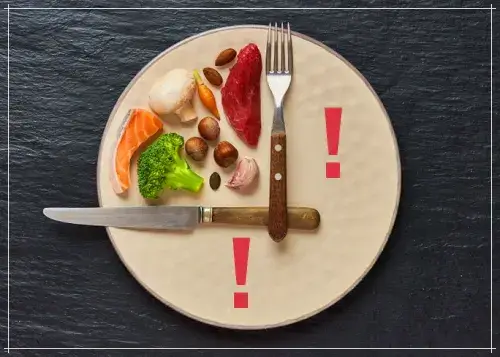Fasting. Such an action—I’ll say more—this thoughtless tendency can end badly. We are talking about a simple break from eating or, if you prefer, fasting.
I wouldn’t be surprised if many of us have had this idea cross our minds quite often.
Fasting and Its Side Effects.
A person can live only 5-7 minutes without oxygen but about a week without water. The last thing a human body needs is food, as one can survive without it for a couple of months. Hard to believe, but it’s true!
Surviving, Not Living!
During fasting, a person rapidly loses weight, suffers from a lack of energy, and may unexpectedly experience the onset of latent diseases that had not manifested themselves before the fasting began.
Moreover, the constant feeling of hunger directly affects a person’s character and behavior.
A persistently empty and growling stomach will make you extremely irritable. A group of English and Austrian scientists decided to determine exactly how human behavior changes when they are hungry.
How does a hungry person change externally and internally?
How Does Fasting Affect Human Health?
First, let’s look at how a lack of nutrition physically affects a person. The body’s complex system is responsible for the sensations of hunger and satiety.
Firstly, the body’s leptin levels decrease. Leptin is the hormone that sends signals to the brain about satiety.
Fasting and Leptin, What Is It?
Leptin is a hormone secreted by fat tissue that suppresses appetite and promotes weight loss. In other words, leptin tells the brain that it’s time to stop eating and start using stored energy.
A normal level of this hormone helps maintain a stable weight without constantly monitoring calorie intake and energy expenditure. A lack of leptin increases appetite and contributes to weight gain.
At the same time, the stomach begins to produce more ghrelin, which affects neurons in the hypothalamus—a brain region that regulates hunger, thirst, and other bodily functions.
As a result, brain cells become activated, causing a real sense of distress due to hunger.
Ghrelin and Fasting, What Is It?
Ghrelin is known as the “hunger hormone.” Studies have shown that people who were given this hormone felt hungry and ate significantly more than usual.
This hormone affects the brain’s pleasure center, making you crave another piece of cake simply because you remember how delicious and satisfying the first piece was.
Scientists have no doubt that ghrelin is the “villain” that makes people eat and overeat.
What Happens When a Person Is Hungry?
If a person does not have access to food for an extended period, muscle mass begins to decrease. Blood glucose levels drop, prompting the pancreas to release more glucagon.
In high concentrations, glucagon causes strong relaxation of the smooth muscles in internal organs. The body starts losing energy, leading to a reduction in the mass of muscles, the liver, the spleen, and several other organs.
When cellular energy reserves are depleted, amino acids are produced through the breakdown of soft tissues. Understandably, this is the body’s last resort to obtain energy.
Needless to say, when a person is malnourished, not only does glucose level drop, but so do all other metabolic processes.
As a result, a person not only experiences a growling stomach but also constant weakness. Depending on their health condition and the duration of fasting, blood pressure decreases, heart rate slows, immunity weakens, and swelling occurs.
Fasting Depletes a Person’s Strength and Health.
All these internal changes reflect in the appearance of a hungry person. It immediately becomes evident—the condition of their hair and nails worsens, gums start bleeding, wounds take longer to heal, and so on.
Person’s Character, and Hunger?
Recently, scientists sought to determine how hunger influences a person’s temperament. To do so, they gathered a group of 64 volunteers aged 18 to 60 and conducted a simple experiment.
The men and women were asked to record their emotions throughout the day for three weeks using a special app. They could select multiple emotions at once, such as hunger and anger or satiety and pleasure.
The compiled data showed that the feeling of hunger was most often accompanied by anger (34%), irritability (37%), and a lack of pleasure (38%).
At the same time, as you might expect, well-fed people were happy and satisfied. Researchers noted that the results remained unchanged regardless of gender, age, BMI, or other characteristics of the participants.
Currently, scientists do not know precisely why hunger has such a negative impact on a person’s emotional state.
Logically speaking, it makes sense—a person wants to eat, feels bad due to a lack of nutrients, and wants to satisfy their hunger as soon as possible.
However, from a scientific perspective, there is no clear explanation. One hypothesis is that aggression and irritability result from a lack of sugar, which we truly need for a good mood.
Nevertheless, this explanation is insufficient, and more research should be conducted on this topic.
Everyday Life and Fasting.
In everyday life, we may feel hungry for at most a few hours—until we get home or stop by a café. However, history has seen times when people were forced to fast for months. Of course, many survived, but believe me, they were not happy.
So, fasting makes a person angry and grumpy. Would you want to interact with such an individual? I think it would be difficult and short-lived. Let’s just be ourselves.
Of course, overeating isn’t good either.



